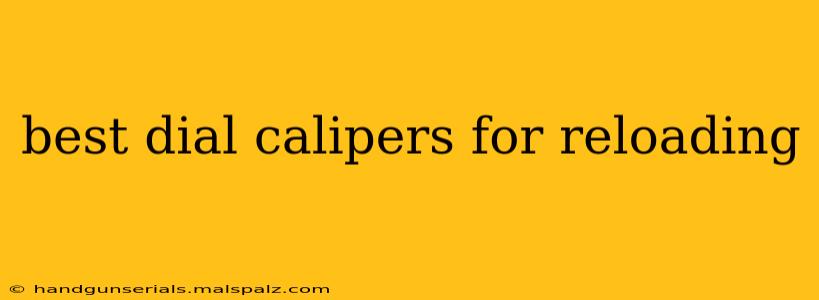Reloading ammunition is a precise process demanding accuracy at every stage. One of the most crucial tools for achieving consistent, safe, and accurate reloads is a high-quality dial caliper. Choosing the right caliper can significantly impact the quality and safety of your ammunition. This guide explores the features to look for and highlights some of the best dial calipers available for reloading enthusiasts.
Why Dial Calipers Are Essential for Reloading
Dial calipers provide the precision necessary for measuring various components during the reloading process, including:
- Bullet Diameter: Ensuring your bullets are the correct diameter for your chosen caliber is paramount for safe and accurate firing. Incorrect bullet diameter can lead to dangerous pressure increases.
- Case Length: Measuring case length is critical for consistent chambering and preventing overpressure. Variations in case length can cause malfunctions or damage to your firearm.
- Neck Diameter: Accurate neck diameter measurement is crucial for proper bullet seating and consistent neck tension.
- Overall Cartridge Length (OAL): This measurement ensures the loaded cartridge fits safely within your firearm's chamber. Incorrect OAL can lead to dangerous pressure spikes or jams.
Improper measurements with less precise tools can result in dangerous overpressure situations, leading to firearm damage or injury. Using a reliable dial caliper minimizes this risk.
Key Features to Consider When Choosing a Dial Caliper for Reloading
While many dial calipers are available, certain features make some models better suited for the demands of reloading:
- Accuracy: Look for calipers with a resolution of at least 0.001 inch (0.02 mm). Higher resolutions provide more precise measurements, crucial for fine-tuning your reloading process.
- Durability: Reloading involves repetitive use, so choose a caliper constructed from durable materials like hardened stainless steel to withstand regular handling.
- Ease of Use: A caliper should be comfortable to hold and easy to operate. Smooth movement of the jaws and a clear, easy-to-read dial are essential.
- Jaws: Ensure the caliper features both inside and outside jaws for versatile measurement needs. Some calipers also include depth probes for added functionality.
- Zeroing Mechanism: A reliable zeroing mechanism allows you to quickly and accurately reset the caliper to zero, improving efficiency during measurement.
- Maintenance: Consider how easy the caliper is to clean and maintain. Regular cleaning is important to prevent debris from affecting accuracy.
Top Considerations When Selecting Your Caliper
Beyond the technical specifications, consider these factors:
- Budget: High-quality calipers can range in price. Determine your budget and choose a caliper that offers the necessary features within your price range. Investing in a quality instrument will pay off in the long run.
- Brand Reputation: Choose calipers from reputable manufacturers with a proven track record of producing reliable and accurate measuring instruments. Look for brands known for their quality control and customer support.
- User Reviews: Check online reviews to see what other reloaders have to say about their experience with various models. User feedback can provide valuable insights into a caliper's performance and durability.
Conclusion: Precision is Paramount
Selecting the right dial caliper is an investment in the safety and accuracy of your reloading process. By considering the features and factors outlined above, you can choose a caliper that meets your specific needs and helps you produce consistent, reliable, and safe ammunition. Remember, precision is paramount in reloading—don't compromise on the quality of your measuring tools.

